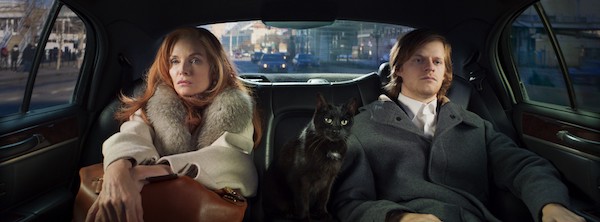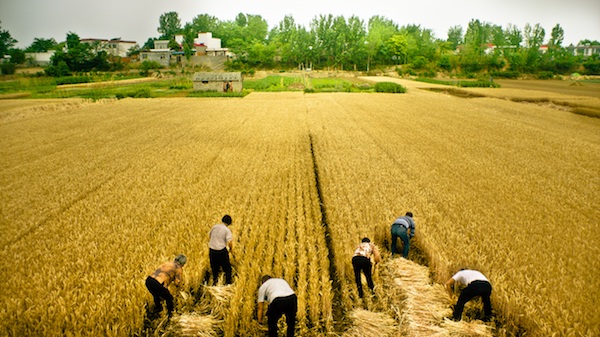Yes, the pandemic has changed everything about the movie industry, from production to exhibition. Unable to hold in-person screenings, theater owners have turned to the only viable alternative, streaming, in the process accelerating the decline of their livelihood.

Even without a pandemic, this year marked big transitions for the New York Film Festival, which celebrated its 58th edition from September 17 to October 11. In May, Lincoln Center announced a restructuring of the Festival, splitting leadership between Eugene Hernandez, Director of NYFF, and Dennis Lim, NYFF Director of Programming. Florence Almozini, K. Austin Collins, and Rachel Rosen were also on the Main Slate selection committee.
This year’s NYFF was positioned as a collaboration with festivals at Venice, Toronto, and Telluride, all of which offered severely reduced schedules. NYFF comes last on the calendar, and is not competitive like the other festivals. That ordinarily affects what titles appear at NYFF—that and a sensibility that leans towards a certain type of film.
Distributors also pulled titles as the pandemic evolved. The Trial of the Chicago 7 at one point was going to open NYFF. Then Paramount sold the film to Netflix, which wouldn’t give permission to screen it. Netflix was an enormous presence at the 57th NYFF, with The Irishman, Marriage Story, and Motherless Brooklyn dominating the schedule.
Normally NYFF screenings take place at the enormous Alice Tully Hall and the more film-friendly Walter Reade Theater, with talks and interviews across the street at the Elinor Bunin Monroe Film Center. This year the introductions, screenings and Q&As were hosted on a cranky but adequate website.
In addition to screening links, NYFF offered some outdoor alternatives: the Queens Drive-In at Flushing Meadows Corona Park, created by Rooftop Films, the New York Hall of Science, and Museum of the Moving Image; the Brooklyn Drive-In at The Brooklyn Army Terminal, created by Rooftop Films and the New York City Economic Development Corporation; and the Bronx Drive-in at the Bronx Zoo. Drive-ins may have seemed like a fun idea, despite seriously degraded sound and visuals. But they were impractical for most festival goers, few of whom own cars. The screenings were a sore point for a festival already difficult to attend.
Last year the festival grappled with what is and isn’t a movie. During a talk after The Irishman, Martin Scorsese wondered whether cinema was breaking into separate categories: theatrical, at this point predominantly action and comic-book adaptations; festival, artsy efforts serving as calling cards; and cable, the meat-and-potatoes of the industry.
This year NYFF more or less threw in the towel, scheduling three episodes from Steve McQueen’s Small Axe series, titles that were never intended to be screened in movie theaters. Roughly an hour each, Mangrove, Lovers Rock (the opening night selection), and Red White and Blue had McQueen’s characteristic intensity and filmmaking brio, but as stand-alone films they felt undernourished.
Is Nomadland, the festival’s centerpiece, a fiction film or a documentary? It’s based on an article, features real-life people playing themselves, and takes place in actual locations. (Staid old 60 Minutes tackled the same milieu a couple of weeks ago, acting as if Nomadland didn’t exist.) Chloe Zhao’s unerring eye and supreme patience pay off in a film that resolutely refuses to become what you want. Unlike The Rider, her last film and a festival darling, Nomadland defies expectations.
Star power at this year’s festival was seriously lacking, apart from festival standbys like Bill Murray. Post-screening Q&As were thankfully limited and moderated, so time wasn’t wasted on endless not-really-a-question-but-I-thought-you-should-have-done-this-or-that comments.
Random encounters with idols were also gone. I remember Murray chatting with fans on a Broadway sidewalk outside Alice Tully Hall before the festival screening of The Royal Tenenbaums. It was right after 9/11, and just seeing him brought a sense of normalcy to a world in upheaval. Even if you were thirty rows away, peering down at Joe Pesci or Scarlett Johansson was an undeniable thrill at last year’s festival. It’s not the same watching someone sitting in a bedroom, captured by an inferior webcam subject to video stuttering and audio dropouts. Everyone tried to pretend what was happening was normal; everyone knew that it wasn’t.

The schedule felt the same way: no matter how you squinted, it didn’t feel like a festival. Some titles will end up on Amazon (Garrett Bradley’s Time is available now), Frederick Wiseman’s City Hall will go to virtual repertory houses before PBS, and Sam Pollard’s MLK/FBI hits IFC. More will virtually disappear after appearing at a few more festivals.
Even the “real” releases won’t get much theatrical exposure. Sofia Coppola’s On the Rocks, an echt-NYFF title, is heading for Apple+ TV. Sony Pictures Classics is holding French Exit, yin to On the Rocks‘ yang, until next year. How likely is that theaters will be open in January?


